
Marc Langley talks with one of British climbing's most devoted disciples: James McHaffie. They talk about Caff's early soloing exploits in the Lake District, a horrifying epic on Cloggy, his shift towards sport climbing and back again, and inclusivity in the sport.
For more than three decades, British climber James McHaffie (Caff) has pushed his limits across multiple climbing disciplines, with numerous hard climbs on his CV such as Big Bang (9a), Long Hope Direct (E10 6c) and multiple flashes of E7 and E8. Born in Keswick, he was surrounded by storied crags such as Gimmer, Esk Buttress and Dow Crag, to name a select few. Taking his first steps with his Dad, at 15 James rattled off classics including Bridges Route (HS) on Esk Buttress and Overhanging Bastion (VS 5a) on Castle Rock. Given his exposure to such crags, it is perhaps unsurprising that James would go on to be one of the most accomplished British climbers we have ever seen.
James quickly made a name for himself in his early 20s, soloing regularly on the local Ambleside crags where he worked at the time. One afternoon in Borrowdale, he soloed over 30 routes of E1 or above - running between the different crags! Prior to this, he had already onsighted routes such as Flattery (E7 6b) (E7 6b) on Flat Crags, Camouflage (E7 6b) (E7 6b) on Cam Crags Borrowdale and De Quincy (E7 6b) (E7 6b) on Bowderstone Crags. Having exhausted much of the Lake District's climbing scene, he moved on to North Wales.
I first met Caff in Llanberis at one of Emma Twyford's epic roast dinner gatherings. Having followed Caff for a number of years, I had fallen guilty of forming preconceived opinions on how someone may be. Making judgements based on what I had seen on social media, for example, or had heard on the grapevine. I have been led astray in the past, being misled by preconceived notions. I had always assumed Caff went about his business relatively quietly, not posting much on social media and keeping his exploits either to himself, or those closer to him.
I assumed - rather naïvely - that there must be an ego. A justifiable one, but still an ego of some sort. What struck me during my first encounter was how seemingly conscientious Caff was. He immediately got chatting to me and was keen to know what I had been up to. It took me by surprise how much interest he showed, but also, how unassuming his presence was. I had made that assumption already, but I was not prepared for quite how engaging he was. I almost immediately asked if he would be interested in doing an interview at some point. After what seemed like a long deliberate pause - he agreed. But with the caveat of waiting a while. I obliged, happily.
Perceptions can be misleading. We are often diverted from the real persona of an individual and instead, we judge people by the comments of others and not by their own. I caught up with Caff on a number of different occasions over the two years that followed our first encounter. We conversed about politics, equity and equality, sometimes climbing, sometimes raving. I always left our encounters with an impression of someone who was conscientious, a voice for the disadvantaged, yet all the while also being subtly vulnerable himself. A human, who just wants to be his best, either on committing routes or just in life in general.
Climbing can be an inherently selfish pursuit, especially when you are operating at a consistently high level. What things have you had to sacrifice in order to achieve what you have in climbing, and has time made you view any of these sacrifices differently?
I've heard people say that about climbing a lot and unless taken to the extreme ends of obsession I wouldn't take climbing as any more selfish than any other hobby people have or indeed means of living. When I observe people who are and are not climbers I haven't observed any more selfish behaviour in them, in fact, I'd say climbers are generally on the thoughtful side, most give lots of time to their friends and families. Most people who say 'so and so' are selfish normally require a bit of self-reflection.
That being said trad is time-consuming when compared to bouldering or even sport. Jesus, it can be slow, even if you're going well. When I got into climbing I guess I sacrificed having a relationship (or indeed thinking about one) as I was obsessed in my late teens and very into soloing, and it was intoxicating. I loved soloing in the mountains, on the big crags. And with soloing I think you can have a stronger case that it's selfish because the risks are obvious, unlike most climbing which is safer than mountain biking. I'd be surprised if anyone clocked up as much mileage in the mountain crags of the UK without a rope, maybe Jimmy Jewell in Wales, Big Ron in the Peak and John Arran when he was in these areas. I felt sorry for mum, lots of people 'told me off' for doing it but I saw it as an extension of scrambling.
I was too focused on climbing during my late teens and wish I'd applied myself to studies at a younger age. It took me a while to work out that some of the best things in life come through hard work and discipline. Nowadays if I run a good event or initiative in my work which I feel is having a positive effect on people's lives, it can feel as good as a great climbing day.
Apart from resting a bit more, and studying a bit more and with more vigour, I wouldn't look back on time climbing as a sacrifice, it's given me some of the best times of my life, given me loads of friends I can rely on and who can rely on me and is something I'll do until the end I think. I enjoy hanging out with my family and friends and supporting them as much as possible too.
I've plenty of regrets, some of which have felt overwhelming sometimes, but time spent climbing on my own or with friends isn't one of them.
In 2000 you had your first encounter with Jerry Moffatt's incredible line - Master's Wall (E7 6b). 18 years later you went back and ticked it. You said that attempt in 2000 was 'the biggest epic' you ever had. What made you want to go back after such a harrowing experience? What did the route mean to you in 2000 and did it still mean the same in 2018?
Yes, it was off the radar for epic. As I mentioned after climbing it, I think it's E9 and Jerry was clueless about the grade, nearly died and other people didn't go where Jerry went and so thought 'it was ok'. In 2000, these routes meant everything and because I did loads of soloing, it meant my head was good on serious terrain. There is a big difference between bold routes, which you'll just fall a long way on, and these serious ones where a fall is likely to be catastrophic. Soloing might well be the best possible training for these serious routes.
I was living for climbing and excelling on the serious ones at the time. My push on Master's Wall in 2000 when it was a bit green and I couldn't find the rock 6 (because there is next to nothing there) and I ran it out above a skyhook to my highpoint will be the most powerful piece of climbing I've done. It was miles tougher than The Bells, The Bells! (E7 6b), it made that seem like a piece of piss.
After I dropped the ropes and was clinging on for hours to near the end of my skin and tendons, trying not to die, I did realise it was foolish to die on a piece of rock, that my family would be mourning and I felt a fool. I thought a million thoughts in that last 30 minutes, and every few seconds I thought I wouldn't last another 30 seconds.
When I was off the wall I could easily have stopped climbing from that 'event' and it made me more calculated before setting off rather than trying to bulldoze upwards whatever the consequences.
I did the Indian Face (E9 6c) in 2013 after a quick abseil and as Master's Wall still got E7 in the guide and was a listed route in Extreme Rock, I thought it would be an easy tick after an abseil, as a month or two earlier I'd done two other E9 slabs in two days: The Walk of Life (E9 6c) and Once Upon a Time in the South West (E9 6c) without much inspection. On many of the other E9s I've done, I've made an effort to do them in one session, and not to siege them.
But after I abseiled it a few times I realised it was a bit harder than graded, then when I led it, knowing it pretty well, it felt harder again, so much more serious than most E9s I've done, which is 14-15 or so. I know I had history with it but I went and read Jerry's account about being totally out of his depth and everything fell into place for me. It changed UK climbing history in that the first E9 was three years before Indian Face. I found it funny that I didn't realise and nobody else realised how hard it was because of the 'cloudiness' of history. You wouldn't mistake this route after doing it for an E7 and it will be considerably more dangerous than most E9s out there.
What it meant in 2018 to me apart from changing UK climbing history was that I knew I could finish Extreme Rock, on paper at least. Admittedly I did get close to losing my head when I decked out on Controlled Burning (E4 5c) when a hold snapped and a runner blew, but I got away with it.
Climbing has never felt so mainstream. More people are climbing indoors and venturing outside as its popularity increases. Do you think this is having an impact on the environment and what do you think climbers should be doing if anything to help ensure we protect the planet?
I think we have been focused on small environmental issues, such as erosion, respecting the rock etc, when the elephant in the room is climate change. I think we should all assess our lifestyles, most people could make 20-30% energy reductions with no detrimental effects on their quality of life. Home heating, ethical banking and sales, less flying, engage with and support protest groups such as Extinction Rebellion and Youth Strikes.
Admittedly, I'm a bit of a pessimist but I envisage sometime in the 2030s or before, things could be catastrophic. I'd like Extinction Rebellion to make grim posters for parents about the world they are leaving them if they don't get the hell active and do something about it.
I used to think with Obama in power and the Paris Agreement that things would go in the right direction but until Greta, it was apparent this issue which will soon be defining - unless there is a nuclear war - was being ignored by most people. I think if you've got kids or friends with kids, you should be doing something now as the 2030s are not far away and quite a lot can go wrong before then.
I'm not predicting good outcomes on climate change and have warned friends to read up on the worst-case scenarios and how to prepare for them. Getting sandbags, that kind of thing.
It seemed, in the earlier years of your climbing. You were drawn more to traditional climbing, then in 2008 there was a shift in your focus - sport climbing became your discipline of choice. Two years later you climbed Big Bang adding your name to the list of British climbers to have climbed 9a. What did sport climbing offer you which trad didn't at the time?
Trad climbing is always my discipline of choice, to be honest. I enjoy sport routes but I've mainly seen it as training for trad stuff in the past. As for some trad routes, like those found on Dove and Pembroke, sport fitness opens up the options. For many of the standard trad routes, having a good head will be massively more beneficial than having a honed body.
In 2009, I started to boulder a lot more. My friend Pete Robins had just done Silk Cut (V14) in Parisella's Cave along with a ton of other hard blocs. We'd always been comparable boulderers before and it was obvious I had to pull my thumb out. I did most of the 8As in the Llanberis Pass and a couple of 8A+s that year. I'm still well impressed with Pete's bouldering achievements as he's done most of the hard ones in North Wales and he doesn't train. I read Dave Mac's book 9 out of 10 Climbers which stated the importance of bouldering and it clicked into place in terms of the volume of hard climbing you can do in an hour.
In 2010, I did do a bit more sport. My partner at the time, Sophie was doing her NQT in Chesterfield so we lived in Matlock. Cheedale was dry and John Clark rebolted everything, legend. I really liked it down there and there was a good scene, I went there and Lower Pen Trwyn a bit.
Sport climbing can send your endurance through the roof if you get into redpointing and teaches you a lot about tactics, training and strategy. If you go trad climbing and you are fit, you can climb pretty much every day, even if you are onsighting E6s and 7s. As soon as you are maxing out on hard sport you need to rest loads or else you just climb shit.
In 2011, I went to LPT in mid-June and took it super seriously to try really hard and bring everything to attempt The Big Bang (9a). Earlier that year, I'd just been trad shuffling but 6 weeks later I'd done it and the month afterwards I felt I could anything. I got close to onsighting Predator (8b) when it was warm, did it 2nd go, then did Unjustified (8b+) in a few goes later that afternoon. Wish I'd made it out to Spain really, to Rodellar or somewhere with good endurance routes. Onsighting some E8s that same month and I wasn't getting pumped on them. I remember doing double session training days on the Tuesday and Wednesday, before work and after work, then leaving two full rest days before a redpoint day to rest and be healthy the day before any attempt. Hard sport climbing makes your body adapt to the strains a lot more than the easier, slower trad shuffling ever will, but it's not the same. Sport is by and large much more performance-based I would say; I want to climb 8a, 8b, 8c, 9a etc., whereas with trad if you go and do Dream of White Horses, or Steeple, Flying Buttress etc, it doesn't matter about the grade or performance.
As soon as I'd done The Big Bang (9a) and The Meltdown (9a) in 2012, I went back to trad shuffling most of the time - for variety and adventure it's just hard to beat. I remember in 2012/13 I could do Youthanasia (8b+) (8b+) putting the clips in, do another three laps, then finish on an 8a down there and I didn't think I was that fit! Oh to be young and healthy, I'm going to get a kicking next time I go down there.
I found it hard to maintain the discipline for hard sport redpointing, going to the same place, again and again, being really healthy all the time, resting loads and therefore doing fewer routes. Sport redpointing can be great fun but sometimes it appears to be something of a killjoy, same place, same route, same training, same salad, same early nights and if you've got the same two routes left down LPT and don't sport climb or boulder much, you might get to know the same bolts pretty well too.
It was amusing in late 2010 though, a famous climber (mainly for headpointing) had a go at me about sport climbing too much but I'd still onsighted over a dozen E7s the odd E8 and loads of E6s in 2009 and 2010, which I knew was harder onsighting on trad than most of the main proponents of headpointing in the UK had done.
You seem to reminisce of your days soloing the big crags of the Lake District - like the lover that got away in your youth. This was something you were prolific at - why? Describe what it's like to move unencumbered across terrain most people would aspire to climb with a rope and a partner - let alone solo.
In the Lake District in the mid-90s, it wasn't always easy to find climbing partners. I got into it slowly at first when a friend failed to meet me at Lower Falcon crag. I was frustrated and just set off up Spin Up and then Funeral Way. It became a real habit, addictive. Pete Livesey had said the best training for climbing is climbing and soloing allowed you to do a shit ton of it fast. I knew it was good for training mental control, endurance and technique as there are no second chances if you screw up on a mountain crag solo. On an OK day out trad climbing, you may do 3-6 routes and that's an OK day. Imagine a day where you are doing 5-10 times that, on good multi-pitch climbs, flowing fast and feeling invincible. It was a powerful feeling.
Late teens can be a dangerous time in many ways and when I was 17/18 I was eyeing up bigger and bigger solos, Prana, Bitter Oasis, Dry Grasp, Trilogy, Main Event.
It meant I became very swift over moderate terrain and set me up well for climbing dangerous routes that required a good head. I could have soloed some pretty tricky big routes and had contemplated things like Skye Wall, Great Escape and Strawberries but felt working things to solo was a bit lame and have never wanted to endorse soloing. If some kid went off and thought it a good idea and died there is a strong element of culpability on your part. My friend Adam Hocking did come out and film some of the Lakes 100 mission I did in 2014, but it was pretty last minute (plus he never did anything with it anyway).
I don't have the same skill or yearning for it nowadays, but I remember the feeling of being up on Pavey Ark, Scafell, Cloggy, Gogarth, Pembroke in my late teens and early 20s on my own and it's a bit like when you get lost in the music at a rave.
Climbing has always been perceived as accessible. As the Youth and Equity Officer for the BMC you may have a different view on this. What barriers do you think we need to challenge in order to make climbing more inclusive, if any?
Climbing is becoming more accessible with the greater quantity of climbing walls. This is a key area for people to get involved in now, particularly bouldering which has low costs. Trad climbing is still hard to access, it's expensive, slow to acquire the skills and can sound a bit nuts when you explain it to beginners. In terms of inclusivity, there are a lot of avenues to explore, particularly media representation of under-represented groups, improving pathways into climbing for lower socio-economic groups and showing the opportunities that just having an interest in what climbing and walking can give, from career opportunities to lifelong friendships and adventures.
I'm secretary for the BMC's equity steering group and many of the people in it have been volunteers for many, many years. They've helped develop things like the Paraclimbing series, Climbing for All, a disability awareness course, support for outdoor leaders in BAME communities, equity symposiums and Black Dog Outdoor walks for people who suffer from Mental Health issues. I could reel off quite a list and if people want to do something positive they can do so, from helping on a BDO walk/climb, setting up a club for people who suffer from disabilities or getting the staff they oversee trained in some of these areas. There is plenty we can all do to make climbing and walking more inclusive and I'm always impressed by the volunteers who have dedicated themselves to doing this for years and years.
Lockdown has given us all the opportunity to dwell, plan and learn. With that in mind, what's next for you now we are somewhat free again?
I've done quite enough dwelling the last few years but am certainly ready for the freedom.
I've recently acquired Hard Rock and Classic Rock and have one route left in Extreme Rock. I'm keen to finish all the routes in the trilogy by next year, but obviously I need to get myself up Revelations (8b). Should have done it ten years ago when I was bouldering a lot or before Jerry sika'd the pocket making it worse, but hey ho. At least it's accessible. I'm pretty close on finishing all the routes on the Rainbow Slab, Huntsman's Leap and I guess Gogarth Maincliff, so may pay them a visit.
I think as everyone will feel post-lockdown, it's just nice to hang out with friends again. I'm also keen for Scotland, Pembroke and as soon as we are allowed, a big party.
- INTERVIEW: Nick Bullock - Comfort 27 Feb, 2019
- INTERVIEW: Mina Leslie-Wujastyk - The Journey so Far 3 Oct, 2018

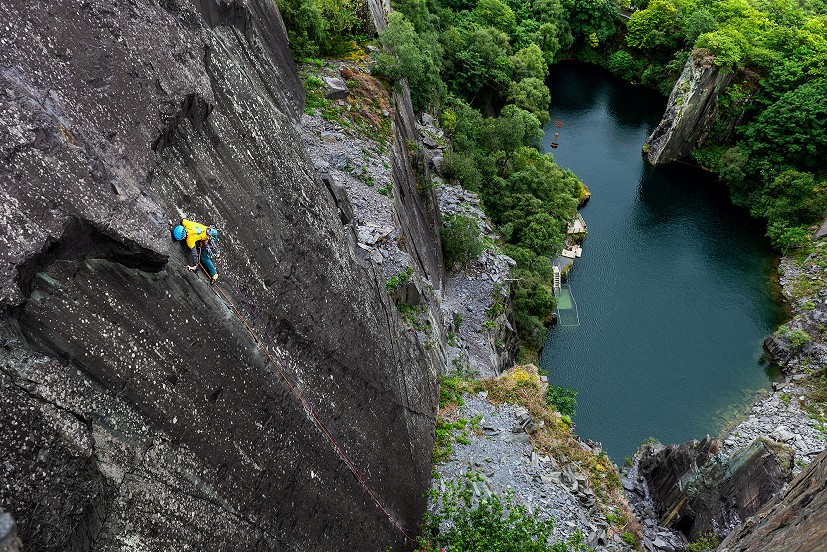
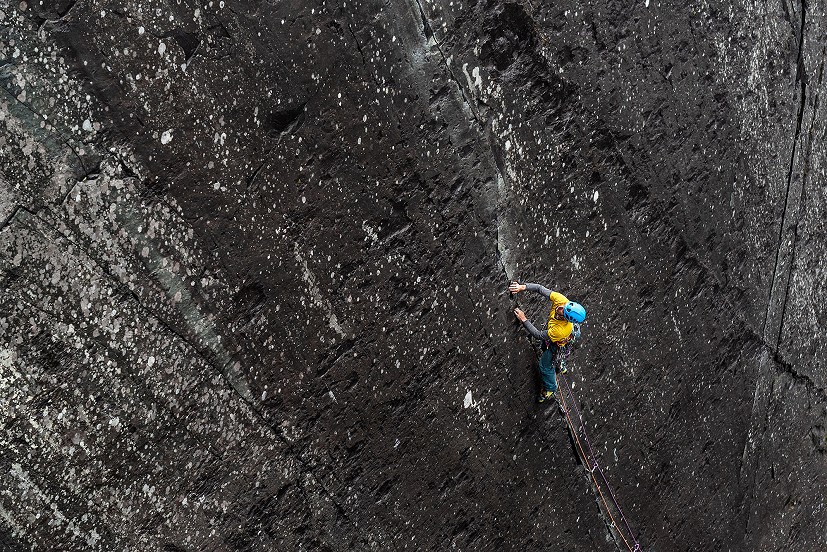
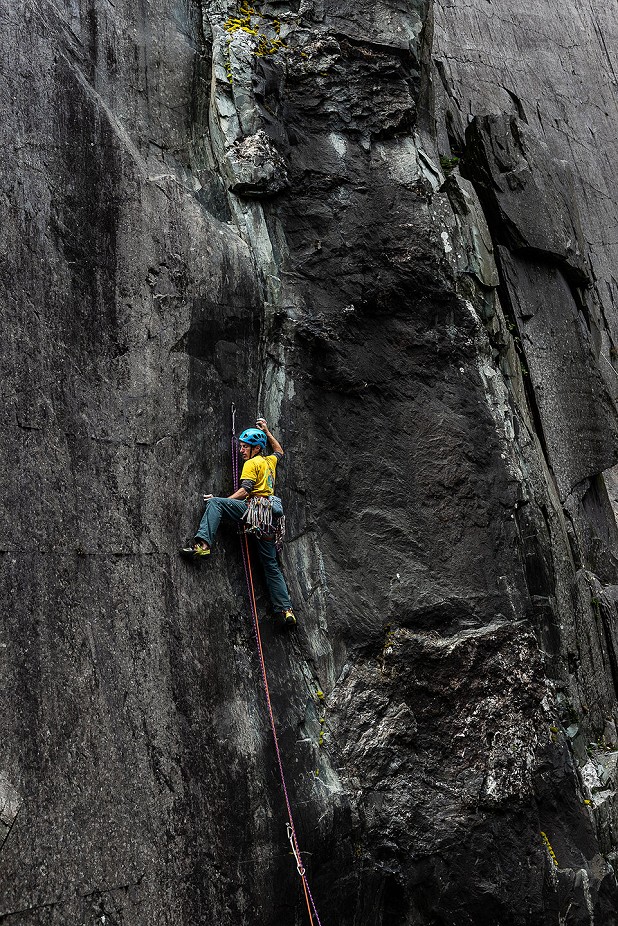
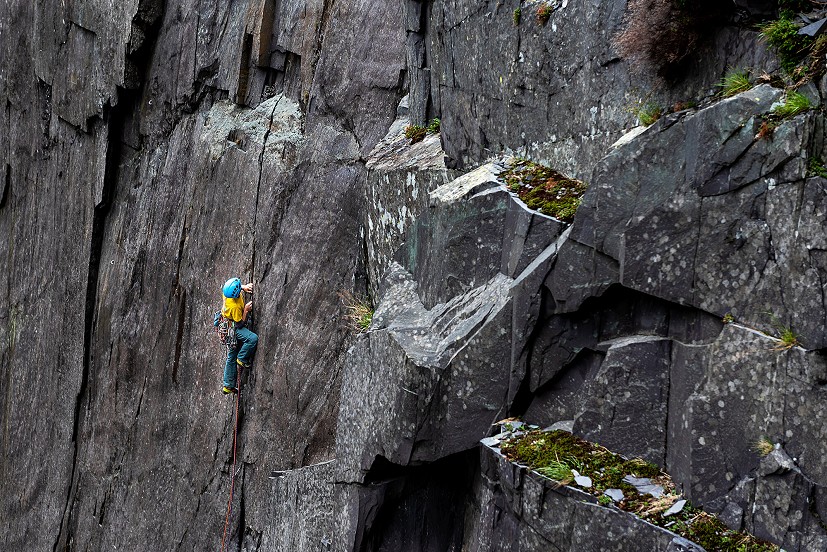


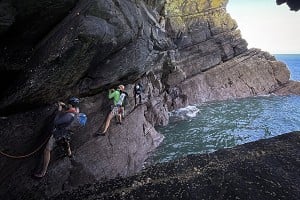








Comments
Hands down Britain's best traditional climber.
If by 'traditional' we mean onsight, then I don't think many would disagree.
I'm waiting to hear Haffie breaks a few bones - if not, then it's plain he's not trying hard enough ;)
Interesting bit about history being re-written re Master's Wall. Has this been reflected in a guidebook yet? And is it thought that Leo went a slightly different way?
And is it thought that Leo went a slightly different way?
When Leo did it 20 or so years ago he moved right lower down into the crack. Pretty good effort as a kid in baggy shoes.